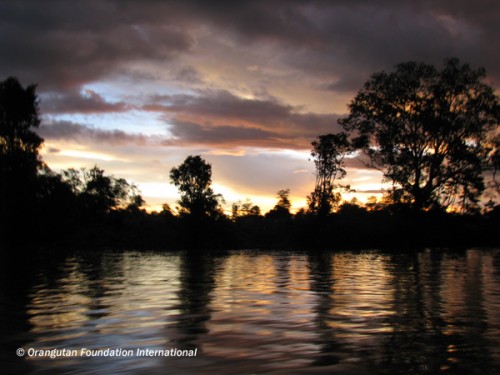Orangutans need forests. That’s why protection of the forests is OFI’s first priority. Illegal activities, such as logging, clear-cutting, and poaching, represent constant threats to the survival of all wildlife in the forest, including orangutans. By protecting forests in the region, OFI directly ensures that forests will be available for local orangutan populations and all other wildlife for years to come.

Dr. Biruté Mary Galdikas has been working directly in Tanjung Puting National Park (initially a wildlife reserve) since 1971. OFI began supporting this work after it was established in 1986. Sometimes it means OFI being involved or even leading campaigns on the Park’s behalf. Our ongoing forest patrols, management of the ex-captive orangutan population (which includes providing daily feedings and medical services), as well as our monitoring of the forest itself have all been instrumental in preserving the Park from illegal logging and encroachment. OFI has also been instrumental in bringing eco-tourism and, thus, revenue to local communities. Dr. Galdikas’ presence over four decades has had a lasting impact in the area as well. Her long-term field research, intense lecture schedule, books, journal articles, media interviews, films (such as Born to be Wild) have all brought prominence and tourism to Tanjung Puting making it the largest tourist attraction in the province for international tourists. This, no doubt, has helped to spare it from some of the destruction inflicted on other National Parks in the area.
OFI also protects local forests outside Tanjung Puting by purchasing and guarding forested land. This is a difficult task necessitating much time, effort, and funding. OFI also works with the government, at the local and national levels, to set up reserves (such as Lamandau Wildlife Reserve) and protected forests (such as the Pasir Panjang Village Forest). Forest is also protected by providing employment to local communities. OFI directly employs almost 200 local people in conservation work. OFI also runs educational programs concerning orangutan and forest conservation in local communities and for palm oil companies, including a training program now in its third year for the managers and high level staff of the largest palm oil company in Indonesia. Managers are trained to implement a Zero Tolerance policy on the killing, harming, or capturing members of endangered species, including orangutans. Managers are trained to be trainers so that they may themselves bring the Zero Tolerance policy and forest protection issues to all the workers of the company.


